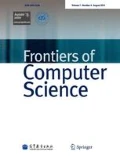References
Corry L. Nicolas Bourbaki and the concept of mathematical structure. Synthese, 1992, 92(3): 315–348
Mac Lane S. Categories for the working mathematician. Springer Science & Business Media, 1971
Shannon C E. A mathematical theory of communication. ACM SIGMOBILE Mobile Computing and Communications Review, 2001, 5(1): 3–55.
Petri C A. Kommunikation mit automaten. Dissertation for the Doctoral Degree. Darmstadt: Technical University, 1962
Feigenbaum E A, McCorduck P. The fifth generation, artificial intelligence and Japan’s computer challenge to the world. Boston: Addison- Wesley Pub. Co., 1983
Lu R. Looking for amathematical theory of knowledge. Proc. of KEST, 2004: 3–8
Lu R. Towards a mathematical theory of knowledge — Categorical analysis of knowledge. Journal of Computer Science and Technology, 2005, 20(6): 751–757
Crane L. Clock and category: is quantum gravity algebraic? Journal of Mathematical Physics, 1995, 36(11): 6180–6193
Baez J C, Dolan J. Categorification. 1998, arXiv preprint math/9802029
Barr M, Wells C. Category Theory for Computer Science. 2nd ed. Englewood Cliffs, NJ: Prentice Hall, 1998
Moggi E. Notions of computation and monads. Information and computation, 1991, 93(1): 55–92
Wang Q, Rong L. Typed category-theory based micro-view emergency knowledge representation. 2007, 568–574
Cockett J R B, Hofstra P JW. Introduction to Turing categories, Annals of Pure and Applied Logic, 2008, 156(2): 183–209
Soare R I. Recursively enumerable sets and degrees. Bulletin of the American Mathematical Society, 1978, 84(6): 1149–1181
Kleene S C, Post E L. The upper semi-lattice of degrees of recursive unsolvability. Annals of Mathematics, 1954, 59(3): 379–407
Li M, Vitányi P. An introduction to Kolmogorov complexity and its applications. Heidelberg: Springer, 1997
Leinster T. Higher operads, higher catagories. Cambridge: Cambridge University Press, 2004
Author information
Authors and Affiliations
Corresponding author
Additional information
Ruqian Lu graduated from the department of mathematics, University Jena, Germany in 1959, and is currently a professor of computer science at Mathematical Institute of the Academy of Mathematics and Systems Science, China. He is also a fellow of Chinese Academy of Sciences. His research interests include artificial intelligence, knowledge engineering, knowledge based software engineering, formal semantics of programming languages and quantum computing.
Rights and permissions
About this article
Cite this article
Lu, R. A peep at knowledge science in a categorical prospect. Front. Comput. Sci. 10, 767–768 (2016). https://doi.org/10.1007/s11704-016-6905-4
Received:
Accepted:
Published:
Issue Date:
DOI: https://doi.org/10.1007/s11704-016-6905-4

